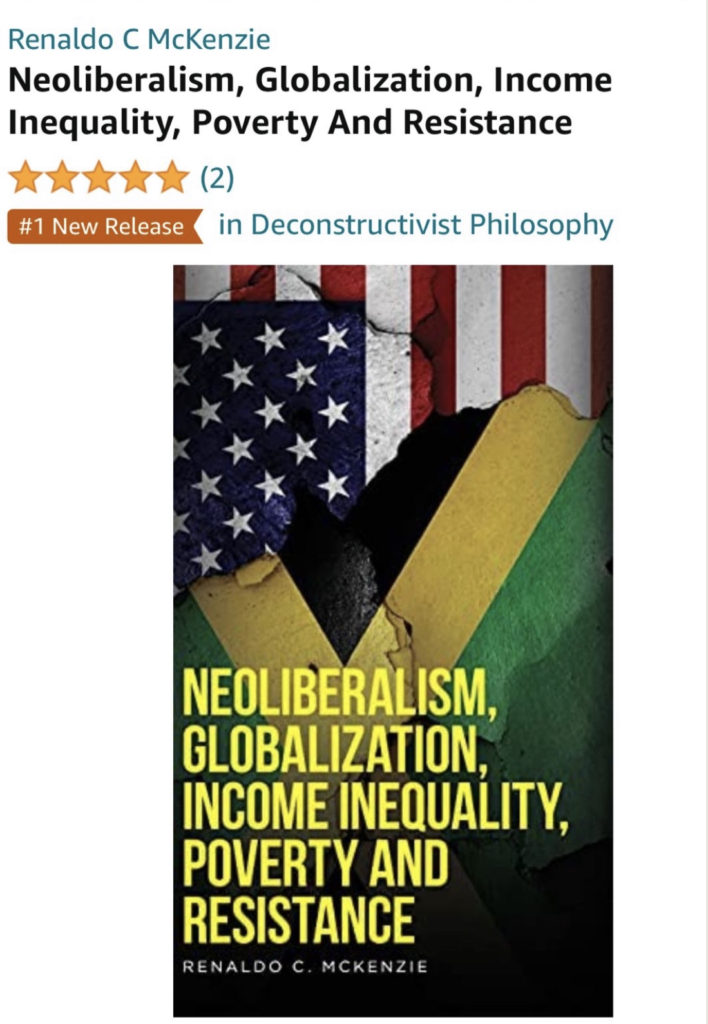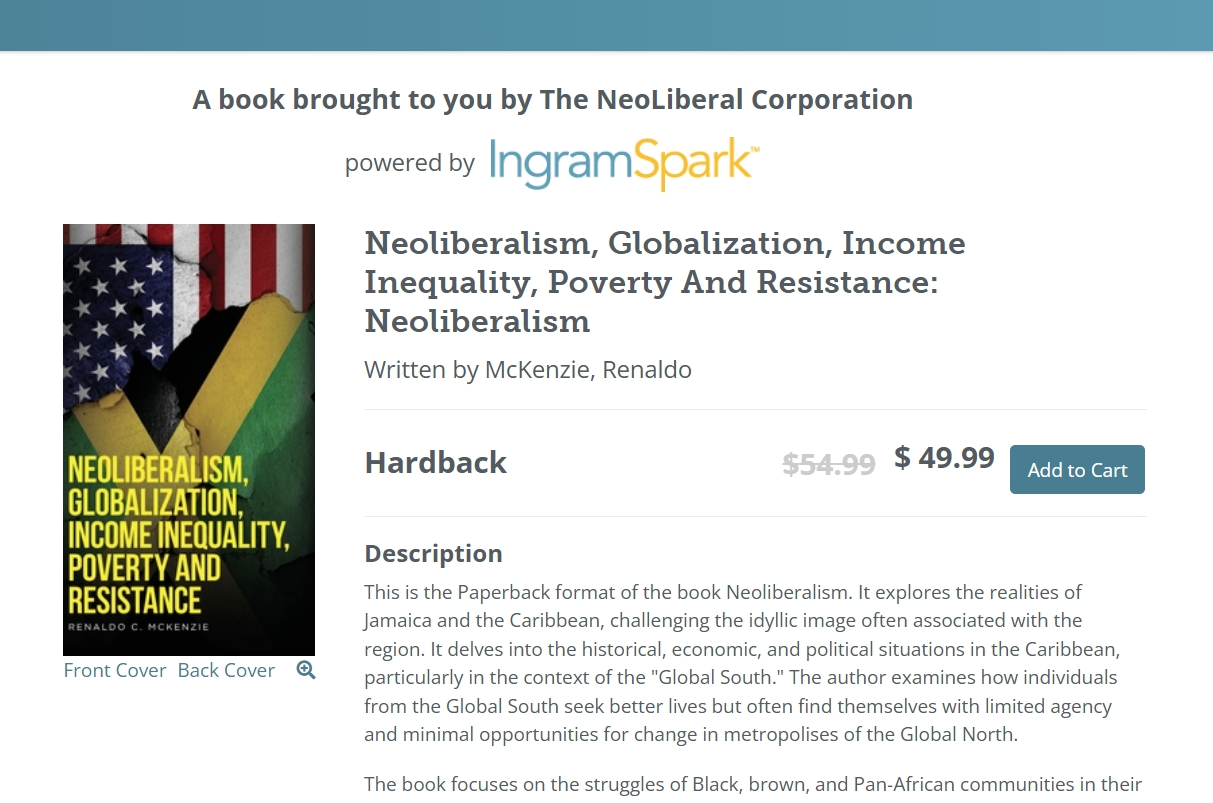Description
Neoliberalism… is an examination of race, power, history, philosophy, politics, economics and resistance in relation to the United States, Jamaica, other former colonized countries, and the world. It explores the realities of Jamaica and the Caribbean, challenging the idyllic image often associated with the region. It delves into the historical, economic, and political situations in the Caribbean, particularly in the context of the “Global South.” The author examines how individuals from the Global South seek better lives but often find themselves with limited agency and minimal opportunities for change in metropolises of the Global North.

The book focuses on the struggles of Black, brown, and Pan-African communities in their pursuit of economic prosperity, justice, and freedom since decolonization. It questions their ability to shape their own futures and achieve true political independence and economic well-being. The discussion also highlights the corrupt aspects of the status quo, where a few benefits from partnerships with the neoliberal regime while the masses are left behind.
Using an interdisciplinary and comprehensive approach, the essay draws from various disciplines and experiences, extending beyond Jamaica to encompass the wider Caribbean and the diaspora in the United States. It encourages readers to challenge existing narratives, critically analyze the subject matter, and develop their own thinking within the Jamaican, Caribbean, diasporic, and American contexts.
The book outlines a two-part project. Part A aims to examine whether Jamaica’s inequality trends are a consequence of the structural adjustment policies imposed by neoliberal technocrats of the Washington Consensus. It explores the impact of “structural adjustment” on Jamaica’s economy and its relationship to income inequality and poverty from the 1960s to 2008.
Part B argues that Jamaica, like many former colonies, remains far from independent despite its experience with neoliberal restructuring. It explores how the Caribbean’s economic policies have transformed since World War II, influenced by the resurgence of neoliberalism in the 1980s. The essay discusses the deepened dependence of Jamaica on the new global elite and the implications of decolonization and neoliberal globalization, drawing upon Frantz Fanon’s ideas.
Overall, this book aims to provide a platform for examining and addressing the challenges, opportunities, and solutions concerning Caribbean and Pan-African issues. It encourages critical thinking and exploration of these topics to foster meaningful engagement and sustained improvements in living standards for the people of the region.

Reviews:
- Kirkus Reviews describes it as an erudite analysis of Jamaica’s economic history!
2. George The Poet one of Britain’s successful contemporary Poets wrote that “I’ve actually read the whole thing and I loved it. I was looking for a complete account of Jamaica’s post-independence economic journey and that’s exactly what you gave me”.
3. According to Professor Emeritus, Dr. Martin Oppenheimer, “RENALDO was one of my most interesting students at Penn whom I’ve had the pleasure of advising on several thesis and works. His book project is really very good. His treatment of Black nationalism and Marcus Garvey in the context of the globalized economy is unique, and really a brand-new interpretation. That’s just one of many very interesting points he covers. The thesis is very thorough, very provocative, well-argued, and overall, more than acceptable.
MARTIN OPPENHEIMER is Professor of Sociology at Rutgers University and University of Pennsylvania. He has written The Hate Handbook (Lexington) and The State of Modern Society and is a contributor to Renaldo’s upcoming book Neoliberal Globalization Reconsidered, Neo-Capitalism and The Death of Nations.

About The Author:
Rev. Renaldo McKenzie is a member of Phi Beta Sigma Fraternity and the author if the new book, “Neoliberalism, Globalization, Income Inequality, Poverty And Resistance.” He was born in Jamaica to the Rev. Bernella and the Late Rev. Lurkenum McKenzie and studied Economics at Bridgeport High School and Excelsior Community College, and Theology and Counseling Psychology at the Jamaica Theological Seminary. After completing his Ministerial formation, he was ordained to the Ministry of Word and Sacrament by the United Church in Jamaica and the Cayman Islands. While in ministry, Renaldo founded the Andrew’s Memorial United Church Health Clinic which serves the local community in Mandeville, Jamaica. Renaldo also worked with a quasi-government agency in Jamaica after his service with the church had ended to assist with planning and implementing a national youth service project with the national youth services and the Jamaica Values and Attitudes Project. Renaldo migrated to the US in 2009 and developed an interest in Neoliberalism, Globalization, poverty and inequality after his first year as a graduate student at the University of Pennsylvania. After watching the film “life and debt” in a class at Penn, Renaldo embarked on studying Neoliberal Globalization which helped him to write his first book: “Neoliberalism, Globalization, Income Inequality, Poverty and Resistance” published April 2021. Renaldo went on and completed a post-graduate degree which explored the concepts discussed in this book but focuses on “globalization in the post-industrial world”, the American context with American scenarios. Rev. McKenzie is currently at Georgetown University where he is reading for his Doctorate. Renaldo is a Visiting Professor at The Jamaica Theological Seminary and is working on another book, Privilege, Power, Position, Status and Secrets to Unlocking Divine Intervention. Renaldo is President of The Neoliberal Corporation and Producer of The Neoliberal Round Podcast.
Table of Contents
Preface · · · · · · · · · · · · · · · · · · · · · · · · · · · · · · · · · · · · · · · · xi
Part A: Neoliberal Restructuring, Income Inequality, and Poverty · · · · · · · · · · · · · · · · · · · · · · · · · · · · · · · · · · · · · 1 1 INTRODUCTION · · · · · · · · · · · · · · · · · · · · · · · · · · · · · · · · · · · · · · · 3
2 NEOLIBERAL RESTRUCTURING CREATES INCOME INEQUALITY AND POVERTY · · · · · · · · · · · · · · · · · · · · · · 12
A The History and Principles of Neoliberalism and Neoliberal Globalization · · · · · · · · · · · · · · · · · · · · · · · · · · · · 14
B Neoliberalism, the Social Democratic View, and the Second World War · · · · · · · · · · · · · · · · · · · · · · · · · · · · · · · · 19
C Neoliberalism and the Neoliberal State · · · · · · · · · · · · · · 23
D On Measuring the Relational Effects between Neoliberal Globalization and Income Inequality and Poverty: the Gini Coefficient and the Inverted-U Hypothesis. · · · · · · · · · · 26
i Defending Structural Adjustment · · · · · · · · · · · · · · · 32
E On the Necessity and Inevitability of Poverty and Inequality in the Neoliberal Society · · · · · · · · · · · · · · · · · · 36
F Conceptualizing and Understanding Jamaica’s Experience with Neoliberalism and Neoliberal Globalization · · 38
3 BRIEF OVERVIEW OF JAMAICA’S SOCIOPOLITICAL AND ECONOMIC CONTEXT · · · · · · · · · · · · · · · · · · · · · · · · · · 41 A 1494–1960’s: From Columbus “Buck up” to Independence · · · · · · · · · · · · · · · · · · · · · · · · · · · · · · · · · · · · · · · · · · · 41 B 1970s: Manley and the Experiment with Socialist Democracy · · · · · · · · · · · · · · · · · · · · · · · · · · · · · · · · · · · · · · · 47
C 1980s: Seaga and the Acceleration of Structural Adjustment toward Neoliberalism · · · · · · · · · · · · · · · · · · · 49
D 1990–2000s: The WTO, NAFTA, More Hardships, and PATH · · · · · · · · · · · · · · · · · · · · · · · · · · · · · · · · · · · · · · · · · · ·51 E The Effects of Neoliberal Global Recession on Jamaica 54 F What Observations Can Be Made about Poverty and Income Inequality in Jamaica? · · · · · · · · · · · · · · · · · · · · · · 58
4 THE EVOLUTION OF NEOLIBERAL STRUCTURAL ADJUSTMENT IN JAMAICA · · · · · · · · · · · · · · · · · · · · · · · · · · · · 64 A 1970s: Economic Welfare and Decline; Unbalanced Approach and Bureaucratic Conspiracy · · · · · · · · · · · · · · 65
B 1980s: Dependent Capitalism and Measured Adjustment—Mixed Results · · · · · · · · · · · · · · · · · · · · · · · · · 70
C 1990s–2005: Vigorous Adjustment · · · · · · · · · · · · · · · · · · 74
i Privatization · · · · · · · · · · · · · · · · · · · · · · · · · · · · · · · · · · 74
ii Trade Liberalization · · · · · · · · · · · · · · · · · · · · · · · · · · · 76
iii Financial Deregulation · · · · · · · · · · · · · · · · · · · · · · · · · 79
iv Exchange-Rate Devaluation · · · · · · · · · · · · · · · · · · · · 80
v Labor Market and Tax Reform · · · · · · · · · · · · · · · · · · 83
vi Public Spending on Social Services · · · · · · · · · · · · · 85
D Summarizing the Rationale behind and Process of Neoliberal Restructuring in Jamaica · · · · · · · · · · · · · · · · · 87
5 IMPLICATIONS OF SAPS: TRENDS AND ANALYSIS ON ECONOMIC AND SOCIAL INDICATORS · · · · · · · · · · · · · · · ·91 6 CONCLUSION TO PART A · · · · · · · · · · · · · · · · · · · · · · · · · · · · · 106
A Assessment of the Relationship between Trends and Market Development · · · · · · · · · · · · · · · · · · · · · · · · · · · · · 106 B What Lessons Can Jamaica Teach Us about Neoliberal Globalization? · · · · · · · · · · · · · · · · · · · · · · · · · · · · · · · · ·113 C “Does Jamaica Provide Any Lessons for Small Countries with Big Debts?” · · · · · · · · · · · · · · · · · · · · · · · · · · · · · 121 D Is There Any Hope for Jamaica, the Caribbean? · · · · · · 126
E The Key is Science and Technology · · · · · · · · · · · · · · · · · 130
i Implement training programmes · · · · · · · · · · · · · · · 133
F Combatting Corruption in Jamaica by Studying 127 Peoples’ Perceptions of the level of Corruption is absolutely nonsense and a Waste of needed Resources that could’ve helped to Alleviate serious Problems in Jamaica. · · · · 134
G Neoliberal Globalization and the Trump Effect · · · · · · · 139
Part B: Decolonization, Neoliberal Globalization, and Resistance · · · · · · · · · · · · · · · · · · · · · · · · · · · · · · · · · · · · 143
7 CARIBBEAN FANONISM · · · · · · · · · · · · · · · · · · · · · · · · · · · · · · 145
A Independence and Globalization: Myth and Countermyth · · · · · · · · · · · · · · · · · · · · · · · · · · · · · · · · · · · · · · · · · · · · · · · 149 B The Fate of National Liberation and Postcolonial Reconstruction····································154
C What Conclusions can we draw from Fanon on the Efficacy of a Nation’s Political Independence and it’s ability to Reconstruct itself as a Sovereign and Developed Country? · · · · · · · · · · · · · · · · · · · · · · · · · · · · · 157
8 HOW EFFECTIVE IS THE RESISTANCE MOVEMENT FOR GLOBAL JUSTICE? · · · · · · · · · · · · · · · · · · · · · · · · · · · 164 A The Background and Causes of the Resistance for Global Justice · · · · · · · · · · · · · · · · · · · · · · · · · · · · · · · · · · · ·164 B The History and Development of the Global Justice Movement—Resistance Movements Have Roots in Black Struggle in the Americas and the African Diaspora · · · 170
i From The American Civil War to the End of the Eighteenth Century · · · · · · · · · · · · · · · · · · · · · · · · · · · 170
ii The Nineteenth Century · · · · · · · · · · · · · · · · · · · · · · · 173
iii The Twentieth Century · · · · · · · · · · · · · · · · · · · · · · · · 175
C From Black Power to the Global Justice Movement · · 183
i September 11, 2001 · · · · · · · · · · · · · · · · · · · · · · · · · · · 184
ii Resistance and Protests after 9/11 · · · · · · · · · · · · · · 187
D Neoliberal Opposition to the GJM · · · · · · · · · · · · · · · · · · 190
E Forms and Strategy of the Resistance: Violence versus Nonviolence: Effective Strategies for Social Change · · 195
F Will the GJM and Resistance against Neoliberalism Succeed? · · · · · · · · · · · · · · · · · · · · · · · · · · · · · · · · · · · · · · ·204 G Situating Social Issues and Local Tensions within the Global Neoliberal Framework: · · · · · · · · · · · · · · · · · · · · · 210
i Global Justice Movement Protests at International Events · · · · · · · · · · · · · · · · · · · · · · · · · · · · · · · · · · · · · · 214
9 ON THE LIMITATION OF BLACK NATIONALISM AND GARVEYISM · · · · · · · · · · · · · · · · · · · · · · · · · · · · · · · · · · · · 217 A Garvey’s Fascist Ideological Roots · · · · · · · · · · · · · · · · · 220
B Garvey, War, and Imperialism · · · · · · · · · · · · · · · · · · · · · · 224
C What Insights does Garvey’s Nationalism and Resistance Provide for Postnational Subjectivity and Economic · · 229 10 NEOLIBERALISM, GLOBAL RECESSION, THE AMERICAN INNER CITY, AND BLACK LIVES MATTER PROTESTS 231 A From Global Justice Movements to Black Lives Matter Movements · · · · · · · · · · · · · · · · · · · · · · · · · · · · · · · · · · · · 231 B Revisiting Articles on Resistance: Black Lives Matter Movement—Discourse and Blog · · · · · · · · · · · · · · · · · · · · 239 i Article 1: On Diluting and Corrupting Resistance for Justice: BLM and Those Marching for Equality and Justice Are Terrorists · · · · · · · · · · · · · · · · · · · · · · · · · 240
ii Article 2: Black-on-Black Crime Nullifies Black Resistance against the Status Quo · · · · · · · · · · · · · 250
iii Article 3: You See how the Status Quo Maintain and Advance their Power? · · · · · · · · · · · · · · · · · · · · · · · · 252
iv Article 4: Myth or Truth: The “Mammas”, Covid, the Democratic Plot to Win the US Elections and the Burden and Difficulty of Republican to find proof · · 255
11 CINEMA AND NEOLIBERAL GLOBALIZATION: CAN CINEMATIC FILM BE AN EFFECTIVE TOOL IN CREATING CHANGE IN LIGHT OF GLOBALIZATION? · · · · · · · · · · · · · · 262
A Probably the Answer to Neoliberalism Lies in Film · · · 262
B On the Film Life and Debt · · · · · · · · · · · · · · · · · · · · · · · · · 264
i Points to Discuss and Explore for Further Consideration: · · · · · · · · · · · · · · · · · · · · · · · · · · · · · · · 269
C Cinema and Neoliberal Globalization: On Dirty Pretty Things: Exposition of the Underground Economy · · · · 272
i Dirty Pretty Things and the Visual Realism of Invisibility as a Tool of Exploitation in Neoliberal Globalization · · · · 272
ii Dirty Pretty Things Answers the Question: What Is Neoliberal Globalization? · · · · · · · · · · · · · · · · · · · · · · 278
iii Dirty Pretty Things Visualizes Immigration, Border Protection, and the Western Politics of Migrants’ Exploitation 284
D Conclusion · · · · · · · · · · · · · · · · · · · · · · · · · · · · · · · · · · · · · · 296
Bibliography/References · · · · · · · · · · · · · · · · · · · · · · · 303
Published by: Palmetto Publishing, 2021 and The NeoLiberal Corporation.
Copyrighted by Renaldo McKenzie, Catalogued at the US Library of Congress.
Revised May 2023.
Visit our Bookshop: Neoliberalism, Globalization, Income Inequality, Poverty and Resistance (Hardcover)
NOW ON SALE UNTIL OCTOBER 31, 2024


